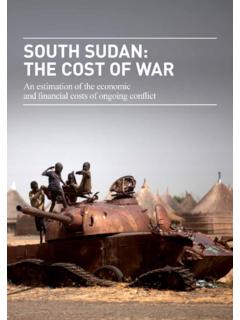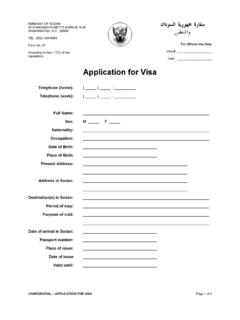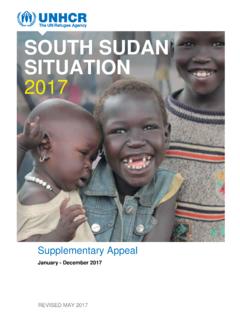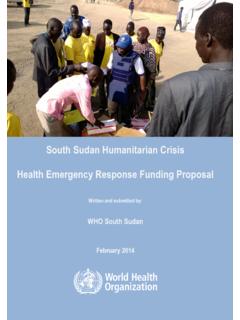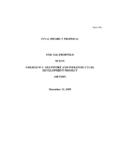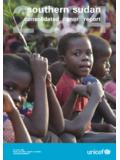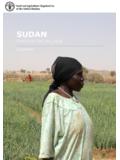Transcription of Women’s Security and the Law in South Sudan
1 Sudan Human Security Baseline Assessment (HSBA) Small Arms Survey * 47 Avenue Blanc * 1202 Geneva * Switzerland 1 women s Security and the Law in South Sudan Despite the official end of war in South Sudan , women s well-being and Security remain under constant threat. The fledgling country has promised to ensure equality and rights for all, yet its very laws are often a source of insecurity for women . Years of war had a devastating effect on the country s justice sector. Much of the limited court infrastructure that existed before the war was destroyed as chronic insecurity prevented development, legal education, and the formation of an effective legal system. As a result, South Sudanese have had limited recourse to the formal justice system. As is the case in many African countries, people rely almost exclusively on traditional courts.
2 Customary laws of South Sudan s many tribes play a critical role in regulating South Sudanese society. During the civil wars customary law provided an important source of cohesion and order in families and communities; it became a means with which responsibilities were enforced and family support was ensured. Yet the reliance on customary practices has also had negative consequences for women . In many countries customary laws do not provide sufficient protection for women , are deeply patriarchal, casting men as the undisputed heads of their families, with women playing subservient roles. While South Sudan s 2005 Interim Constitution guarantees human rights and equality for all (GoSS, 2005), there is a conflict with numerous rules of customary law which continue to violate women s rights. As the new state develops its justice sector, drafts new laws, and establishes a functional legal system, it faces the challenging task of reconciling customary law with the guarantees of human rights that are enshrined in the constitution.
3 The UN Handbook on Legislation on Violence Against women specifically addresses this situation and recommends that where there are conflicts between customary and/or religious law and the formal justice system, the matter should be resolved with respect for the human rights of the survivor and in accordance with gender equality standards (Recommendation ). This report discusses the law and its effects on women s Security in South Sudan . It describes the parallel court systems and bodies of law, both formal and customary, examining the ways in which they work together in theory and in practice. It assesses how women are affected by the dominant use of customary courts, highlighting particular components of the law that threaten women s Security . Finally, it considers the conflict between customary law and South Sudan s human rights obligations, exploring options for reconciling the two.
4 While there are significant variations among the customary laws of various tribes, this report places a focus on laws that are common to many or most tribes. Nevertheless, the rules and practices described below should not be understood to apply to all communities. Sudan Human Security Baseline Assessment (HSBA) Small Arms Survey * 47 Avenue Blanc * 1202 Geneva * Switzerland 2 The parallel legal frameworks Two bodies of law operate side by side in South Sudan . Statutory law is generated by the state and consists of the constitution, legislation, and precedent created through court judgements. Until a final constitution is drafted, the 2005 Interim Constitution is the highest law of the land and all other laws must be consistent with it. About 40 laws have been drafted for the new state, among them legislation that has a direct bearing on women s Security , such as the Penal Code Act (2008), which sets out various criminal offences, and the Child Act (2008).
5 Operating alongside the statutory system is that of customary law, which consists of numerous unwritten bodies of law that have regulated South Sudan s tribes for centuries. The laws of both systems are binding. The 2005 Comprehensive Peace Agreement, which marked the end of the war, recognized customary law as valid, stating that: All personal and family matters including marriage, divorce, inheritance, succession and affiliation may be governed by the personal laws (including Sharia or other religious laws, customs or traditions) of those concerned (GoS and SPLM/A, 2005, ch. 1, para. ). The Interim Constitution confers legal recognition onto customary law in a number of provisions. The two bodies of law are to operate in parallel, both forming critical parts of South Sudan s burgeoning legal system. Despite the distinct hierarchy in the system, the courts work together in a confusing and often inconsistent manner.
6 Statutory courts, which form the top tiers of the hierarchy, are supposed to provide an avenue for appeal from customary courts. Presided over by judges with formal legal training, these courts apply predominantly statutory but also some customary law, partly in the context of appeals from customary courts. The customary courts represent the bottom tiers of the hierarchy. Although a subject matter division was envisaged between the different types of courts, attempts at enforcing this have been ineffective. Referrals from customary to statutory courts are made inconsistently and without clear regulatory guidelines, with individual chiefs adjudicating in the manner they feel is appropriate. Given the poor state of the statutory courts, customary courts hear the vast majority up to 90 per cent of cases. While it is theoretically possible to appeal from the customary to the statutory courts, the widespread absence of local courts prevents many South Sudanese from accessing the formal legal system.
7 In a 2009 workshop held in Bahr el Ghazal, one woman described the challenges women face in accessing courts: If you complain to the civil court, the judge will mostly refer you back to the customary male chiefs in your tribe. You complain to the male customary chiefs and they will ask you to obey your husband and follow our community culture [..]. Actually we don t know where to find justice (Aldehaib, 2010). Sudan Human Security Baseline Assessment (HSBA) Small Arms Survey * 47 Avenue Blanc * 1202 Geneva * Switzerland 3 Chiefs who preside over customary courts are generally older men with deeply ingrained patriarchal views, which are reflected in their decisions. Research shows that chiefs are more easily swayed by men s interests and points of view and that their judgements are often biased in favour of men (UNFPA and DPK, 2008). As in many African countries, customary courts are often held out in the open, for example under a large tree, and community members are free to observe the proceedings.
8 Normally many more men than women attend the courts, which can make them intimidating for a woman. Chiefs also take crowd support and opinion into consideration. A largely male crowd can thus influence matters in favour of male litigants. As customary law is unwritten, chiefs seldom refer to written sources for guidance on punishment, although some do have copies of the penal code, to which they refer. A recent study compares customary court cases in four regions of South Sudan , revealing significant variation in decisions and sentences. Court decisions varied between rural and urban areas, between different tribes and populations, and depending on the attitude and education level of the individual chiefs (UNFPA and DPK, 2008). Such variations preclude any sense of confidence in the law, meaning that women cannot look to the courts for guaranteed or consistent protection.
9 Across the country, law enforcement services are weak and police are undertrained and under-resourced. In particular, police are given little training on how to handle cases of gender-based violence and for the most part, they have little knowledge of the concept of women s rights. women in focus groups explained that police often refuse to deal with women who report domestic abuse, claiming that this area falls outside of their jurisdiction and sending them home to address the issue within their families. women complain that police meet reports of sexual violence with indifference or counter-accusations (D Awol, 2011). Police officers are perceived to be incompetent or corrupt and are known to set suspects free in exchange for small bribes (Small Arms Survey, 2010). In some cases, police have reportedly arrested rape victims for adultery or incarcerated them for their own protection until a perpetrator was caught.
10 Police insensitivity can be a significant barrier for women who are seeking protection. The newly developed Special Protection Units seek to address this shortfall. Situated at police stations, these specialized units are staffed by police who are specially trained to assist women and children offering legal aid, protection, medical care, and psychosocial support. The development of these units has been slowed by a lack of trained personnel, however, and they remain largely unavailable outside of major urban centres. Customary law and women Customary law is said to be the legal expression of the practices, customs, and beliefs of the people. Chief Justice Ambrose Thiik explained that customary law embodies much of what we have fought for these past 20 years. It is self-evident that customary Sudan Human Security Baseline Assessment (HSBA) Small Arms Survey * 47 Avenue Blanc * 1202 Geneva * Switzerland 4law will underpin our society, its legal institutions, and laws in the future.




